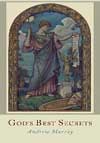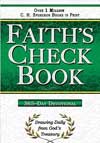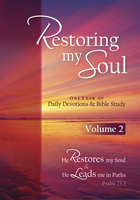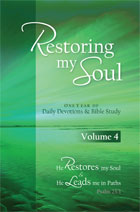|
|
 |

|
|
GO ON TO PERFECTION
慕安德烈每日靈修 God's Best Secrets by Andrew Murray
Scripture: "But solid food is for full-grown men .... Wherefore let us cease to speak of the first principles of Christ, and press on unto perfection."—HEB. vi. 1.

In the Epistle from which this text is taken we read that the Hebrews had long been Christians, and now ought to be teaching others, but instead they were still as babes needing to be fed on milk (Heb. v. 12-14). The apostle seeks to rouse them "to cease to speak of the first principles of Christ, not laying again a foundation of repentance." They were to go on to perfection, to the status of full-grown men, and be prepared for deeper truths which would be taught to them regarding Christ as the High Priest. "But He, because He abideth for ever, hath His priesthood unchangeable. Wherefore He is able to save to the uttermost them that draw near unto God through Him, seeing He ever liveth to make intercession for them" (vii. 24, 25). The truth of this ever-abiding unchangeable priesthood and complete salvation is the solid food of the believer, who desires perfection. In chapter ix. we are told of Christ appearing before the face of God for us, and later that we might enter into the holy place to live in communion with God (x. 19, 20). It is when he ceases to speak of the first principles of Christ, not laying again a foundation of repentance, that the Christian will grow and be strengthened in grace. He will then actually live in full fellowship with Christ. Oh, Christian, if hitherto you have been content to know that you have repented and believe in God, and so are sure of salvation, I beseech you, do remember this is only the beginning of eternal life. Listen to the call to press on to perfection. This is what God desires and what the Son Himself will do for you. Learn to yield yourself fully to Christ and to find daily in Him the hidden life, so that you may grow in grace and God use you as a soul-winner. Nothing less than this conformity to Jesus Christ should sat¬isfy you—a life wholly dedicated to God and to His dear Son.

|
|
Weapons Doomed to Fail
信心的支票簿 Faith's check book
Scripture: "No weapon that is formed against thee shall prosper; and every tongue that shall rise against thee in judgment thou shalt condemn" (Isaiah 54:17).

There is great clatter in the forges and smithies of the enemy. They are making weapons wherewith to smite the saints. They could not even do as much as this if the LORD of saints did not allow them; for He has created the smith that bloweth the coals in the fire. But see how busily they labor! How many swords and spears they fashion! It matters nothing, for on the blade of every weapon you may read this inscription: It shall not Prosper. But now listen to another noise: it is the strife of tongues. Tongues are more terrible instruments than can be made with hammers and anvils, and the evil which they inflict cuts deeper and spreads wider. What will become of us now? Slander, falsehood, insinuation, ridicule-these are poisoned arrows; how can we meet them? The LORD God promises us that, if we cannot silence them, we shall, at least, escape from being ruined by them. They condemn us for the moment, but we shall condemn them at last and forever. The mouth of them that speak lies shall be stopped, and their falsehoods shall be turned to the honor of those good men who suffered by them.

|
|
Morning, November 16
司布真日間靈修 Morning by Morning
Scripture: “The Lord is my portion, saith my soul.”(Lamentations 3:24)

It is not “The Lord is partly my portion,” nor “The Lord is in my portion”; but he himself makes up the sum total of my souls inheritance. Within the circumference of that circle lies all that we possess or desire. The Lord is my portion. Not his grace merely, nor his love, nor his covenant, but Jehovah himself. He has chosen us for his portion, and we have chosen him for ours. It is true that the Lord must first choose our inheritance for us, or else we shall never choose it for ourselves; but if we are really called according to the purpose of electing love, we can sing— “Lovd of my God for him again With love intense I burn; Chosen of him ere time began, I choose him in return.” The Lord is our all-sufficient portion. God fills himself; and if God is all-sufficient in himself, he must be all- sufficient for us. It is not easy to satisfy mans desires. When he dreams that he is satisfied, anon he wakes to the perception that there is somewhat yet beyond, and straightway the horse-leech in his heart cries, “Give, give.” But all that we can wish for is to be found in our divine portion, so that we ask, “Whom have I in heaven but thee? and there is none upon earth that I desire beside thee.” Well may we “delight ourselves in the Lord” who makes us to drink of the river of his pleasures. Our faith stretches her wings and mounts like an eagle into the heaven of divine love as to her proper dwelling-place. “The lines have fallen to us in pleasant places; yea, we have a goodly heritage.” Let us rejoice in the Lord always; let us show to the world that we are a happy and a blessed people, and thus induce them to exclaim, “We will go with you, for we have heard that God is with you.”

|
|
Evening, November 16
司布真夜間靈修 Evening by Evening
Scripture: “Thine eyes shall see the King in his beauty.”(Isaiah 33:17)

The more you know about Christ the less will you be satisfied with superficial views of him; and the more deeply you study his transactions in the eternal covenant, his engagements on your behalf as the eternal Surety, and the fulness of his grace which shines in all his offices, the more truly will you see the King in his beauty. Be much in such outlooks. Long more and more to see Jesus. Meditation and contemplation are often like windows of agate, and gates of carbuncle, through which we behold the Redeemer. Meditation puts the telescope to the eye, and enables us to see Jesus after a better sort than we could have seen him if we had lived in the days of his flesh. Would that our conversation were more in heaven, and that we were more taken up with the person, the work, the beauty of our incarnate Lord. More meditation, and the beauty of the King would flash upon us with more resplendence. Beloved, it is very probable that we shall have such a sight of our glorious King as we never had before, when we come to die. Many saints in dying have looked up from amidst the stormy waters, and have seen Jesus walking on the waves of the sea, and heard him say, “It is I, be not afraid.” Ah, yes! when the tenement begins to shake, and the clay falls away, we see Christ through the rifts, and between the rafters the sunlight of heaven comes streaming in. But if we want to see face to face the “King in his beauty” we must go to heaven for the sight, or the King must come here in person. O that he would come on the wings of the wind! He is our Husband, and we are widowed by his absence; he is our Brother dear and fair, and we are lonely without him. Thick veils and clouds hang between our souls and their true life: when shall the day break and the shadows flee away? Oh, long-expected day, begin!

|
|
Your Crown of Glory
荒漠甘泉 Streams in the Desert
Scripture: "They overcame him by the blood of the Lamb . . . and they loved not their lives unto the death" (Rev. 12:11).

When James and John came to Christ with their mother, asking Him to give them the best place in the kingdom, He did not refuse their request, but told them it would be given to them if they could do His work, drink His cup, and be baptized with His baptism. Do we want the competition? The greatest things are always hedged about by the hardest things, and we, too, shall find mountains and forests and chariots of iron. Hardship is the price of coronation. Triumphal arches are not woven out of rose blossoms and silken cords, but of hard blows and bloody scars. The very hardships that you are enduring in your life today are given by the Master for the explicit purpose of enabling you to win your crown. Do not wait for some ideal situation, some romantic difficulty, some far-away emergency; but rise to meet the actual conditions which the Providence of God has placed around you today. Your crown of glory lies embedded in the very heart of these things--those hardships and trials that are pressing you this very hour, week and month of your life. The hardest things are not those that the world knows of. Down in your secret soul unseen and unknown by any but Jesus, there is a little trial that you would not dare to mention that is harder for you to bear than martyrdom. There, beloved, lies your crown. God help you to overcome, and sometime wear it. --Selected

|
|
The offering of Christ
Restoring My Soul (VOL1) Day 228
References: John 6:51 Luke 22:19 Ex 23:15 Lev 2: 1-3, 11-13 1 Cor 11:24, 27 Eph 5:27 Further Study: Matt 26:26-29 1 Cor 11:23-33

Before He was the Passover Lamb, Christ was the unleavened bread of sincerity and truth. This bread has come down from heaven. It is the bread of life, the living bread. We’ll recall that the offering of firstfruits was presented in the loaf of unleavened bread. This is the pure essence of Christ given for us. He is the firstborn, the firstfruits, having come from the Father. The pure olive oil, symbolising the essential life of Christ, was mixed with the grain offering. This was truly the ‘most holy’ offering.
Unless we eat of this bread, we have no life. In the upper room on the Passover night, Jesus took this unleavened bread and said, ‘This is My body’. If we do not eat of this bread, we have no part with Him. When we join together weekly to eat this bread, we signify our participation in the bread of heaven. Likewise, we are committing ourselves to be one body, one loaf. In this way, we keep the feast. Purging out the old leaven, we are joined together, members in particular of one body.
Taking the bread and the cup, we must discern the body and eat and drink in a worthy manner. When we eat the bread, we are committing ourselves to the process of purging leaven from our lives. Like the Israelites of old, we are keeping the feast for seven days. This is symbolic for us in that we are purging leaven until the fullness and completion of the feasts, when He presents us to Himself without wrinkle or blemish.
Material Provided by 

|
|
The vine of the earth
Restoring My Soul (VOL2) Day 228
References Further Study Phil 2:16-17 John 15:1 Psa 2 Rev 14:18 Rev 16:6, 19 Rev 18:5

When the vine of the earth is harvested, the grapes will be thrown into
the great winepress of the fierce wrath of God and crushed. These ‘grapes’
are the lives of those who have resisted and withstood the testimony of God. This is the blood of those who have lived away from Christ and they will be away from Him forever. They will be crushed in the winepress of wrath as the nations rage. Their blood will be shed as they are thrown into this winepress because they are from the vine of the earth. It will be wrath poured out upon them and they will be made to drink it to the dregs. Wrath will come upon them to the uttermost. Their lifeblood will be given to the nations to drink because they have shed the blood of those who held to the word of God and the testimony of Jesus.
In this great and final outpouring of judgement, ‘Babylon the great’ will be remembered before God, to be given the cup of the wine of His fierce
wrath. The Lord will avenge the blood of bondslaves who have poured themselves out in the same way that God the Son emptied Himself before all ages. These faithful witnesses will sing the song of Moses and the song
of the Lamb. As a bondslave of Christ, Paul testified of ‘holding fast to the
word of life, so that in the day of Christ I will have reason to glory because I did not run in vain nor toil in vain. But even if I am being poured out as a drink offering upon the sacrifice and service of your faith, I rejoice and share
my joy with you all.’
Material Provided by 

|
|
Not giving as a benefactor
Restoring My Soul (VOL3) Day 228
References Further Study Rom 3:12 Rom 12:2 Rom 3 Isa 55:8 Jer 18:15 Luk 22:25-26

The apostle Paul said, ‘Do not be conformed to the world’, because there is a way of giving in the world that is the activity of a benefactor. Jesus said to His disciples, ‘The kings of the Gentiles lord it over them; and those who have authority over them are called “benefactors”’. And then He continued, ‘But it is not this way with you’. It is important to contrast the way of offering with the way of a benefactor. When Jesus spoke of ‘lording it over’, He was not just alluding to a type of autocratic dominion. In the most general terms, He was referring to the fact that a benefactor maintains the ‘superior’ position. As an expression of human virtue, they are bestowing a benefit upon someone else who needs their help. In a form of trading relationship, they are bestowing a benefit and receiving a benefit. Sometimes it is recognition, or it may simply be the self-knowledge that they are doing their part for the good of society. From the Christian perspective, the fallen condition of man is very clear. In his letter to the Romans, the apostle Paul wrote, ‘There is none righteous, not even one; there is none who understands, there is none who seeks for God; all have turned aside, together they have become useless; there is none who does good, there is not even one’. According to this, there is no act of human virtue or human kindness that has any merit before God. The best efforts of fallen mankind are nothing more than ‘useless’. Accordingly, Paul did not want the attitudes behind worldly giving to permeate and corrupt the culture of offering in the church. It is not the outcome of the giving that he was targeting; it was the motivation or ‘way’ of giving.
Material Provided by 

|
|
Jesus Christ is coming in the flesh
Restoring My Soul (VOL4) Day 228
References Further Study Heb 13:10 Joh 6:47, 54 1Jn 5 Joh 3:36 Joh 5:24 1Co 10:16 1Jn 4:2 2Jn 1:7 1Pe 3:18 1Pe 4:1 Eph 3:14-17 1Jn 5:6, 11-12 ~228~

The substance of the gospel is that Jesus Christ is coming in our flesh. He has given us His life on the altar. We have an altar! Jesus said, ‘He who eats My flesh and drinks My blood has eternal life, and I will raise him up on the last day’. We are not waiting until the day of resurrection to receive eternal life. We are receiving the substance of our eternal inheritance here and now as we participate in the offering of Christ. This is the meaning of ‘eating and drinking’. The apostle Paul said, ‘The cup of blessing which we bless, is it not the communion [participation/fellowship] of the blood of Christ? The bread which we break, is it not the communion [participation/ fellowship] of the body of Christ?’ The Father, Son and Holy Spirit testify to the coming of Jesus Christ in the flesh. He is the One who came by water and by blood, and the Spirit bears witness. John said, ‘The testimony is this: God has given us eternal life, and this life is in His Son. He who has the Son has the life; he who does not have the Son of God does not have the life’. By giving us the Son, the Father is likewise giving us His life. This is the substance of all testimony. We bow our knees before the Father who is strengthening us in the inner man so that Christ can dwell in our hearts by faith. This is the gospel of sonship. The Son has come to give us an understanding of the gospel of sonship.
Material Provided by 

|
|
 In the Epistle from which this text is taken we read that the Hebrews had long been Christians, and now ought to be teaching others, but instead they were still as babes needing to be fed on milk (Heb. v. 12-14). The apostle seeks to rouse them "to cease to speak of the first principles of Christ, not laying again a foundation of repentance." They were to go on to perfection, to the status of full-grown men, and be prepared for deeper truths which would be taught to them regarding Christ as the High Priest. "But He, because He abideth for ever, hath His priesthood unchangeable. Wherefore He is able to save to the uttermost them that draw near unto God through Him, seeing He ever liveth to make intercession for them" (vii. 24, 25). The truth of this ever-abiding unchangeable priesthood and complete salvation is the solid food of the believer, who desires perfection. In chapter ix. we are told of Christ appearing before the face of God for us, and later that we might enter into the holy place to live in communion with God (x. 19, 20).
In the Epistle from which this text is taken we read that the Hebrews had long been Christians, and now ought to be teaching others, but instead they were still as babes needing to be fed on milk (Heb. v. 12-14). The apostle seeks to rouse them "to cease to speak of the first principles of Christ, not laying again a foundation of repentance." They were to go on to perfection, to the status of full-grown men, and be prepared for deeper truths which would be taught to them regarding Christ as the High Priest. "But He, because He abideth for ever, hath His priesthood unchangeable. Wherefore He is able to save to the uttermost them that draw near unto God through Him, seeing He ever liveth to make intercession for them" (vii. 24, 25). The truth of this ever-abiding unchangeable priesthood and complete salvation is the solid food of the believer, who desires perfection. In chapter ix. we are told of Christ appearing before the face of God for us, and later that we might enter into the holy place to live in communion with God (x. 19, 20).


 為教會
為教會


 There is great clatter in the forges and smithies of the enemy. They are making weapons wherewith to smite the saints. They could not even do as much as this if the LORD of saints did not allow them; for He has created the smith that bloweth the coals in the fire. But see how busily they labor! How many swords and spears they fashion! It matters nothing, for on the blade of every weapon you may read this inscription: It shall not Prosper.
There is great clatter in the forges and smithies of the enemy. They are making weapons wherewith to smite the saints. They could not even do as much as this if the LORD of saints did not allow them; for He has created the smith that bloweth the coals in the fire. But see how busily they labor! How many swords and spears they fashion! It matters nothing, for on the blade of every weapon you may read this inscription: It shall not Prosper. It is not “The Lord is partly my portion,” nor “The Lord is in my portion”; but he himself makes up the sum total of my souls inheritance. Within the circumference of that circle lies all that we possess or desire. The Lord is my portion. Not his grace merely, nor his love, nor his covenant, but Jehovah himself. He has chosen us for his portion, and we have chosen him for ours. It is true that the Lord must first choose our inheritance for us, or else we shall never choose it for ourselves; but if we are really called according to the purpose of electing love, we can sing—
It is not “The Lord is partly my portion,” nor “The Lord is in my portion”; but he himself makes up the sum total of my souls inheritance. Within the circumference of that circle lies all that we possess or desire. The Lord is my portion. Not his grace merely, nor his love, nor his covenant, but Jehovah himself. He has chosen us for his portion, and we have chosen him for ours. It is true that the Lord must first choose our inheritance for us, or else we shall never choose it for ourselves; but if we are really called according to the purpose of electing love, we can sing— The more you know about Christ the less will you be satisfied with superficial views of him; and the more deeply you study his transactions in the eternal covenant, his engagements on your behalf as the eternal Surety, and the fulness of his grace which shines in all his offices, the more truly will you see the King in his beauty. Be much in such outlooks. Long more and more to see Jesus. Meditation and contemplation are often like windows of agate, and gates of carbuncle, through which we behold the Redeemer. Meditation puts the telescope to the eye, and enables us to see Jesus after a better sort than we could have seen him if we had lived in the days of his flesh. Would that our conversation were more in heaven, and that we were more taken up with the person, the work, the beauty of our incarnate Lord. More meditation, and the beauty of the King would flash upon us with more resplendence. Beloved, it is very probable that we shall have such a sight of our glorious King as we never had before, when we come to die. Many saints in dying have looked up from amidst the stormy waters, and have seen Jesus walking on the waves of the sea, and heard him say, “It is I, be not afraid.” Ah, yes! when the tenement begins to shake, and the clay falls away, we see Christ through the rifts, and between the rafters the sunlight of heaven comes streaming in. But if we want to see face to face the “King in his beauty” we must go to heaven for the sight, or the King must come here in person. O that he would come on the wings of the wind! He is our Husband, and we are widowed by his absence; he is our Brother dear and fair, and we are lonely without him. Thick veils and clouds hang between our souls and their true life: when shall the day break and the shadows flee away? Oh, long-expected day, begin!
The more you know about Christ the less will you be satisfied with superficial views of him; and the more deeply you study his transactions in the eternal covenant, his engagements on your behalf as the eternal Surety, and the fulness of his grace which shines in all his offices, the more truly will you see the King in his beauty. Be much in such outlooks. Long more and more to see Jesus. Meditation and contemplation are often like windows of agate, and gates of carbuncle, through which we behold the Redeemer. Meditation puts the telescope to the eye, and enables us to see Jesus after a better sort than we could have seen him if we had lived in the days of his flesh. Would that our conversation were more in heaven, and that we were more taken up with the person, the work, the beauty of our incarnate Lord. More meditation, and the beauty of the King would flash upon us with more resplendence. Beloved, it is very probable that we shall have such a sight of our glorious King as we never had before, when we come to die. Many saints in dying have looked up from amidst the stormy waters, and have seen Jesus walking on the waves of the sea, and heard him say, “It is I, be not afraid.” Ah, yes! when the tenement begins to shake, and the clay falls away, we see Christ through the rifts, and between the rafters the sunlight of heaven comes streaming in. But if we want to see face to face the “King in his beauty” we must go to heaven for the sight, or the King must come here in person. O that he would come on the wings of the wind! He is our Husband, and we are widowed by his absence; he is our Brother dear and fair, and we are lonely without him. Thick veils and clouds hang between our souls and their true life: when shall the day break and the shadows flee away? Oh, long-expected day, begin!
 When James and John came to Christ with their mother, asking Him to give them the best place in the kingdom, He did not refuse their request, but told them it would be given to them if they could do His work, drink His cup, and be baptized with His baptism.
When James and John came to Christ with their mother, asking Him to give them the best place in the kingdom, He did not refuse their request, but told them it would be given to them if they could do His work, drink His cup, and be baptized with His baptism. Before He was the Passover Lamb, Christ was the unleavened bread of sincerity and truth. This bread has come down from heaven. It is the bread of life, the living bread. We’ll recall that the offering of firstfruits was presented in the loaf of unleavened bread. This is the pure essence of Christ given for us. He is the firstborn, the firstfruits, having come from the Father. The pure olive oil, symbolising the essential life of Christ, was mixed with the grain offering. This was truly the ‘most holy’ offering.
Unless we eat of this bread, we have no life. In the upper room on the Passover night, Jesus took this unleavened bread and said, ‘This is My body’. If we do not eat of this bread, we have no part with Him. When we join together weekly to eat this bread, we signify our participation in the bread of heaven. Likewise, we are committing ourselves to be one body, one loaf. In this way, we keep the feast. Purging out the old leaven, we are joined together, members in particular of one body.
Taking the bread and the cup, we must discern the body and eat and drink in a worthy manner. When we eat the bread, we are committing ourselves to the process of purging leaven from our lives. Like the Israelites of old, we are keeping the feast for seven days. This is symbolic for us in that we are purging leaven until the fullness and completion of the feasts, when He presents us to Himself without wrinkle or blemish.
Before He was the Passover Lamb, Christ was the unleavened bread of sincerity and truth. This bread has come down from heaven. It is the bread of life, the living bread. We’ll recall that the offering of firstfruits was presented in the loaf of unleavened bread. This is the pure essence of Christ given for us. He is the firstborn, the firstfruits, having come from the Father. The pure olive oil, symbolising the essential life of Christ, was mixed with the grain offering. This was truly the ‘most holy’ offering.
Unless we eat of this bread, we have no life. In the upper room on the Passover night, Jesus took this unleavened bread and said, ‘This is My body’. If we do not eat of this bread, we have no part with Him. When we join together weekly to eat this bread, we signify our participation in the bread of heaven. Likewise, we are committing ourselves to be one body, one loaf. In this way, we keep the feast. Purging out the old leaven, we are joined together, members in particular of one body.
Taking the bread and the cup, we must discern the body and eat and drink in a worthy manner. When we eat the bread, we are committing ourselves to the process of purging leaven from our lives. Like the Israelites of old, we are keeping the feast for seven days. This is symbolic for us in that we are purging leaven until the fullness and completion of the feasts, when He presents us to Himself without wrinkle or blemish.

 When the vine of the earth is harvested, the grapes will be thrown into
the great winepress of the fierce wrath of God and crushed. These ‘grapes’
are the lives of those who have resisted and withstood the testimony of God. This is the blood of those who have lived away from Christ and they will be away from Him forever. They will be crushed in the winepress of wrath as the nations rage. Their blood will be shed as they are thrown into this winepress because they are from the vine of the earth. It will be wrath poured out upon them and they will be made to drink it to the dregs. Wrath will come upon them to the uttermost. Their lifeblood will be given to the nations to drink because they have shed the blood of those who held to the word of God and the testimony of Jesus.
In this great and final outpouring of judgement, ‘Babylon the great’ will be remembered before God, to be given the cup of the wine of His fierce
wrath. The Lord will avenge the blood of bondslaves who have poured themselves out in the same way that God the Son emptied Himself before all ages. These faithful witnesses will sing the song of Moses and the song
of the Lamb. As a bondslave of Christ, Paul testified of ‘holding fast to the
word of life, so that in the day of Christ I will have reason to glory because I did not run in vain nor toil in vain. But even if I am being poured out as a drink offering upon the sacrifice and service of your faith, I rejoice and share
my joy with you all.’
When the vine of the earth is harvested, the grapes will be thrown into
the great winepress of the fierce wrath of God and crushed. These ‘grapes’
are the lives of those who have resisted and withstood the testimony of God. This is the blood of those who have lived away from Christ and they will be away from Him forever. They will be crushed in the winepress of wrath as the nations rage. Their blood will be shed as they are thrown into this winepress because they are from the vine of the earth. It will be wrath poured out upon them and they will be made to drink it to the dregs. Wrath will come upon them to the uttermost. Their lifeblood will be given to the nations to drink because they have shed the blood of those who held to the word of God and the testimony of Jesus.
In this great and final outpouring of judgement, ‘Babylon the great’ will be remembered before God, to be given the cup of the wine of His fierce
wrath. The Lord will avenge the blood of bondslaves who have poured themselves out in the same way that God the Son emptied Himself before all ages. These faithful witnesses will sing the song of Moses and the song
of the Lamb. As a bondslave of Christ, Paul testified of ‘holding fast to the
word of life, so that in the day of Christ I will have reason to glory because I did not run in vain nor toil in vain. But even if I am being poured out as a drink offering upon the sacrifice and service of your faith, I rejoice and share
my joy with you all.’
 The apostle Paul said, ‘Do not be conformed to the world’, because there is a way of giving in the world that is the activity of a benefactor. Jesus said to His disciples, ‘The kings of the Gentiles lord it over them; and those who have authority over them are called “benefactors”’. And then He continued, ‘But it is not this way with you’. It is important to contrast the way of offering with the way of a benefactor. When Jesus spoke of ‘lording it over’, He was not just alluding to a type of autocratic dominion. In the most general terms, He was referring to the fact that a benefactor maintains the ‘superior’ position. As an expression of human virtue, they are bestowing a benefit upon someone else who needs their help. In a form of trading relationship, they are bestowing a benefit and receiving a benefit. Sometimes it is recognition, or it may simply be the self-knowledge that they are doing their part for the good of society. From the Christian perspective, the fallen condition of man is very clear. In his letter to the Romans, the apostle Paul wrote, ‘There is none righteous, not even one; there is none who understands, there is none who seeks for God; all have turned aside, together they have become useless; there is none who does good, there is not even one’. According to this, there is no act of human virtue or human kindness that has any merit before God. The best efforts of fallen mankind are nothing more than ‘useless’. Accordingly, Paul did not want the attitudes behind worldly giving to permeate and corrupt the culture of offering in the church. It is not the outcome of the giving that he was targeting; it was the motivation or ‘way’ of giving.
The apostle Paul said, ‘Do not be conformed to the world’, because there is a way of giving in the world that is the activity of a benefactor. Jesus said to His disciples, ‘The kings of the Gentiles lord it over them; and those who have authority over them are called “benefactors”’. And then He continued, ‘But it is not this way with you’. It is important to contrast the way of offering with the way of a benefactor. When Jesus spoke of ‘lording it over’, He was not just alluding to a type of autocratic dominion. In the most general terms, He was referring to the fact that a benefactor maintains the ‘superior’ position. As an expression of human virtue, they are bestowing a benefit upon someone else who needs their help. In a form of trading relationship, they are bestowing a benefit and receiving a benefit. Sometimes it is recognition, or it may simply be the self-knowledge that they are doing their part for the good of society. From the Christian perspective, the fallen condition of man is very clear. In his letter to the Romans, the apostle Paul wrote, ‘There is none righteous, not even one; there is none who understands, there is none who seeks for God; all have turned aside, together they have become useless; there is none who does good, there is not even one’. According to this, there is no act of human virtue or human kindness that has any merit before God. The best efforts of fallen mankind are nothing more than ‘useless’. Accordingly, Paul did not want the attitudes behind worldly giving to permeate and corrupt the culture of offering in the church. It is not the outcome of the giving that he was targeting; it was the motivation or ‘way’ of giving.
 The substance of the gospel is that Jesus Christ is coming in our flesh. He has given us His life on the altar. We have an altar! Jesus said, ‘He who eats My flesh and drinks My blood has eternal life, and I will raise him up on the last day’. We are not waiting until the day of resurrection to receive eternal life. We are receiving the substance of our eternal inheritance here and now as we participate in the offering of Christ. This is the meaning of ‘eating and drinking’. The apostle Paul said, ‘The cup of blessing which we bless, is it not the communion [participation/fellowship] of the blood of Christ? The bread which we break, is it not the communion [participation/ fellowship] of the body of Christ?’ The Father, Son and Holy Spirit testify to the coming of Jesus Christ in the flesh. He is the One who came by water and by blood, and the Spirit bears witness. John said, ‘The testimony is this: God has given us eternal life, and this life is in His Son. He who has the Son has the life; he who does not have the Son of God does not have the life’. By giving us the Son, the Father is likewise giving us His life. This is the substance of all testimony. We bow our knees before the Father who is strengthening us in the inner man so that Christ can dwell in our hearts by faith. This is the gospel of sonship. The Son has come to give us an understanding of the gospel of sonship.
The substance of the gospel is that Jesus Christ is coming in our flesh. He has given us His life on the altar. We have an altar! Jesus said, ‘He who eats My flesh and drinks My blood has eternal life, and I will raise him up on the last day’. We are not waiting until the day of resurrection to receive eternal life. We are receiving the substance of our eternal inheritance here and now as we participate in the offering of Christ. This is the meaning of ‘eating and drinking’. The apostle Paul said, ‘The cup of blessing which we bless, is it not the communion [participation/fellowship] of the blood of Christ? The bread which we break, is it not the communion [participation/ fellowship] of the body of Christ?’ The Father, Son and Holy Spirit testify to the coming of Jesus Christ in the flesh. He is the One who came by water and by blood, and the Spirit bears witness. John said, ‘The testimony is this: God has given us eternal life, and this life is in His Son. He who has the Son has the life; he who does not have the Son of God does not have the life’. By giving us the Son, the Father is likewise giving us His life. This is the substance of all testimony. We bow our knees before the Father who is strengthening us in the inner man so that Christ can dwell in our hearts by faith. This is the gospel of sonship. The Son has come to give us an understanding of the gospel of sonship.